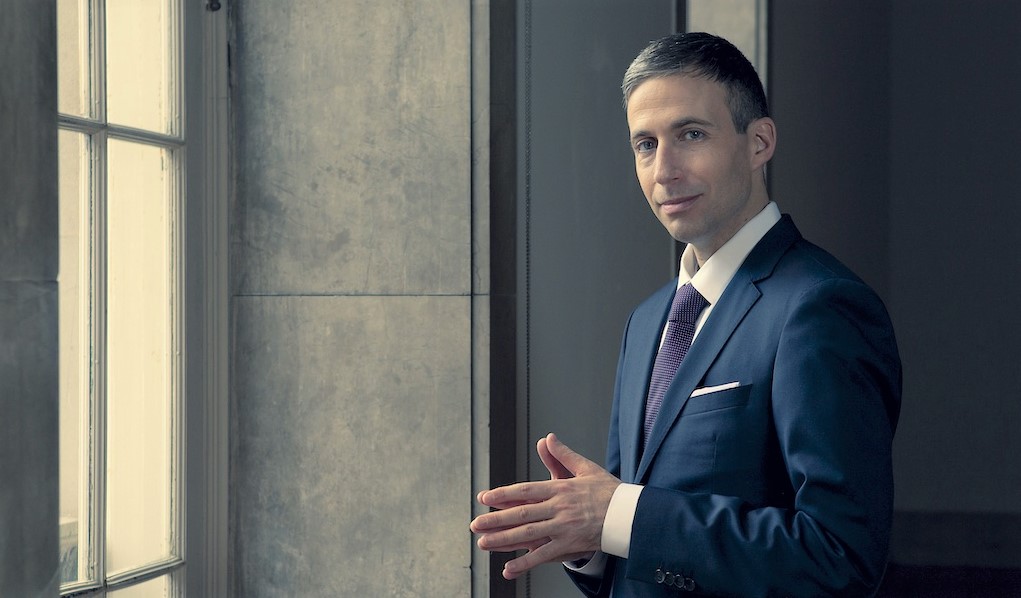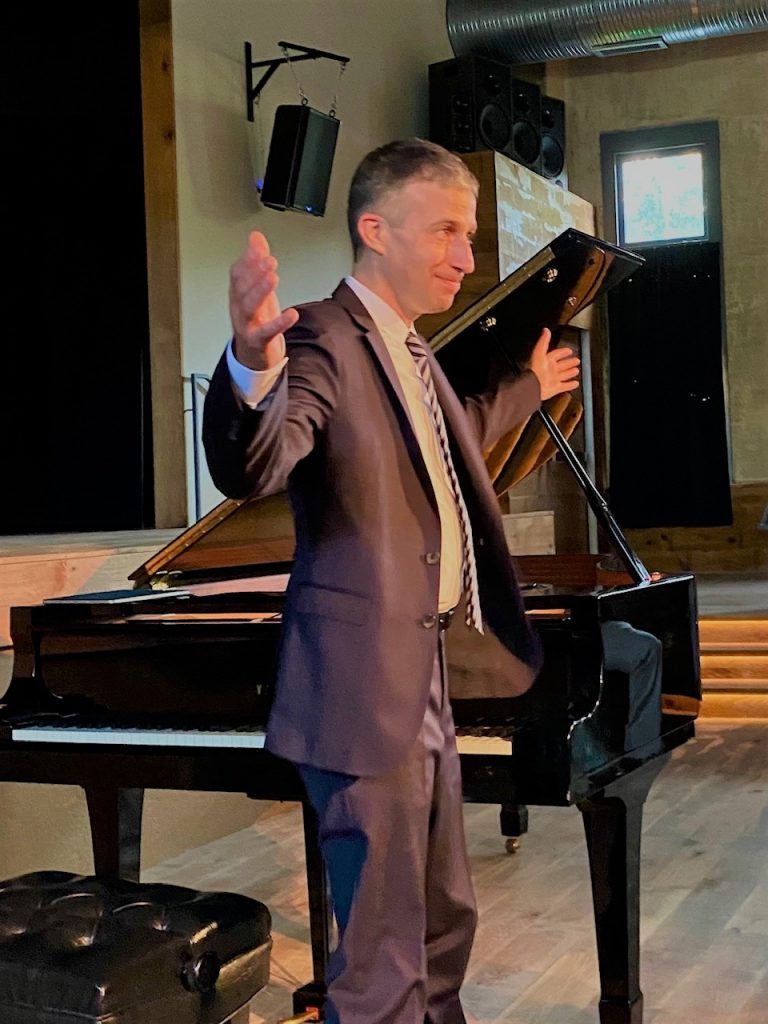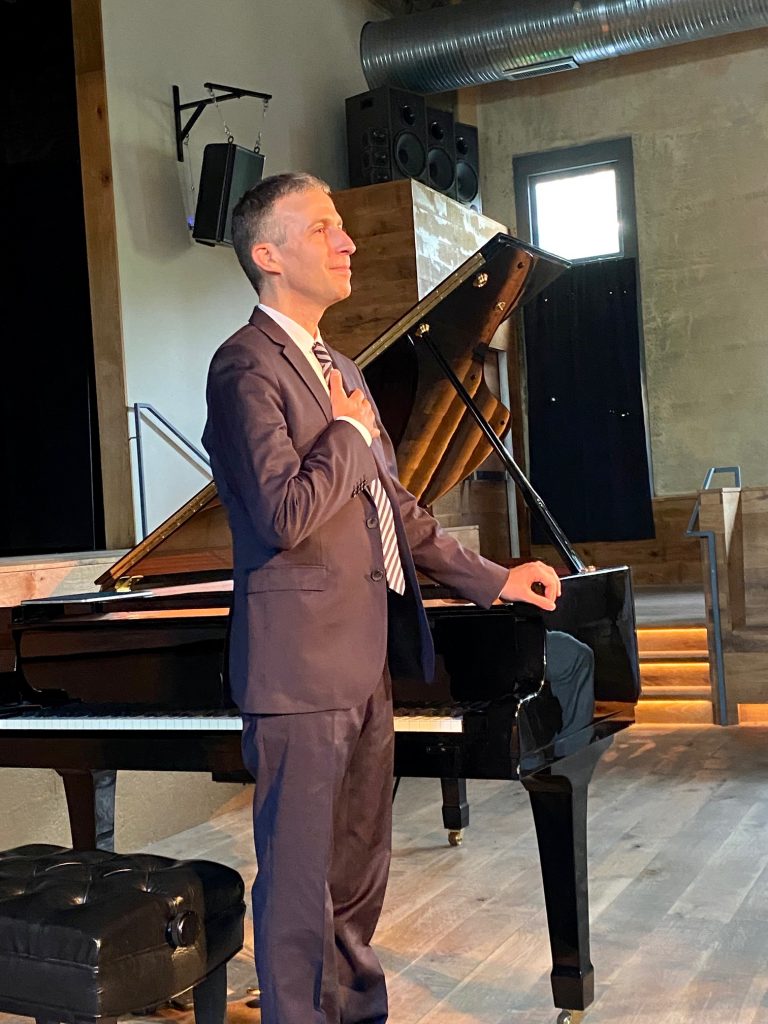
by Tonia Shoumatoff
Benjamin Hochman, piano virtuoso extraordinaire, played to a packed house of over 135 masked and vaccinated listeners at The Stissing Center in Pine Plains on August 13, 2021. Having only performed in a digital concert for his previous engagement at the Center due to the pandemic, he acknowledged how much it meant to him to play to a live audience, saying, “To make music, live, in a room full of people is so meaningful to me.”
Hochman did not disappoint. His adept touch, subtle volume variations, passionate and distinctive interpretations of Beethoven, Brahms, Debussy, and a modern piece by Hannah Kendall delighted the audience.
Starting with Beethoven’s Piano Sonata no. 27 in e-minor, composed in the late summer of 1814 when Beethoven was nearly completely deaf, Hochman slowly captured the gradual lively expressiveness intended for the sonata with his subtle changes of pressure on keys as the melody kept rising and rearising at different moments throughout the two-movement 13-minute sonata. Beethoven called this piece a “contest of head and heart.” Hochman’s dexterous finger work on the keyboard allowed the listener to be increasingly taken by surprise each time the melody was heard again, which was as refreshing as a cool drink on a hot day.

Photo by Tonia Shoumatoff
The second selection was Hannah Kendall’s Processional, inspired by Norman Lewis’s painting titled Procession, a vivid abstract depiction of the bloody civil rights march from Selma to Montgomery, Alabama. Hochman read Kendall’s description of the composition which stated that she was drawn to interpreting the meaning of the painting of the march because she felt it to be as relevant today as when Norman Lewis depicted it. The composition started with piercingly high notes whose echoes were almost painful, becoming gradually lower, finally evolving into an almost impossibly serpentine crescendo of trills requiring amazing keyboard work. Hochman brought to life the impact intended by this work.
The correspondence between fragrance, sound, and color, in three of Debussy’s Preludes from Book One, based on poems from Baudelaire’s avant-garde Les Fleurs du Mal, were captured with panache by Hochman. Cascading ripples of tinkling piano keys, like sunlight (or moonlight) dancing on the edges of ocean waves challenged the listener to hear the synesthesia of color and sound evoked by the mysterious, poetic sequences. Delicately unfolding each note, one after the other, like steps going up and under and into another dimension, hands crossing over each other and back again, Hochman succeeded in creating the feeling of a mysterious fantasy, gradually getting more elaborate, finally ending in a cascade of sparkling sound.
The crescendo of the evening took place when Hochman played Brahms’ Fantasies, op.116. Starting out almost as a lament, Hochman found the rhythm and sequence within the intensity of the piece by using his astounding mastery of the keyboard and the sustaining foot pedal, to express the changes in volume and tone, almost standing up at one point to emphasize the depth required by the composition. Hochman achieved a delicate compromise in hard and soft by sometimes almost tentatively touching the keys to bring each note alive, more fully alive, with tiny moments of tenderness and then at other moments using a more vigorous approach to the emotionalism expressed by the composition by plunging down on the keys. Hochman’s adroit technique of varied pressure, sometimes seeming like strokes in flight, and then building up to the powerful finale unveiling the daunting and almost apocalyptic revelations of the struggle and intense emotionalism inherent in the piece.
Music critics have stated that Opus 116 expresses Brahms’ complicated, unfulfilled love for Clara Schumann. Hochman received a thunderous standing ovation for his interpretation of this difficult composition with the audience continuing to clap after he left the room, demanding an encore. He came back with Cheshire cat smile to play a welcome encore of Franz Liszt’s Dream of Love.

Photo by Tonia Shoumatoff